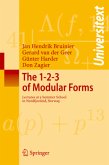This book covers the modular invariant theory of finite groups, the case when the characteristic of the field divides the order of the group, a theory that is more complicated than the study of the classical non-modular case. Largely self-contained, the book develops the theory from its origins up to modern results. It explores many examples, illustrating the theory and its contrast with the better understood non-modular setting. It details techniques for the computation of invariants for many modular representations of finite groups, especially the case of the cyclic group of prime order. It includes detailed examples of many topics as well as a quick survey of the elements of algebraic geometry and commutative algebra as they apply to invariant theory. The book is aimed at both graduate students and researchers-an introduction to many important topics in modern algebra within a concrete setting for the former, an exploration of a fascinating subfield of algebraic geometry for the latter.
From the reviews:
"Modular Invariant Theory is a fitting entry into the 'Encyclopaedia of mathematical Sciences' series: it deals with important living mathematics in a way suited to researchers both at the rookie and more advanced levels." (Michael Berg, The Mathematical Association of America, March, 2011)
"Provide the necessary background in commutative algebra, algebraic geometry, monomial orderings, and SAGBI bases and give many examples. The book should be accessible to second or third year graduate students and will bring any reader up to date on an active area of research." (Frank D. Grosshans, Mathematical Reviews, Issue 2012 b)
"The book is a good source for examples and inspirations in modular invariant theory. ... it is well suited for researchers who aim to get a feeling for recent problems in modular invariant theory and related problems. It can also be used as a companion book for a graduate course in invariant theory of finite groups with a view towards the differences to the modular case." (Peter Schenzel, Zentralblatt MATH, Vol. 1216, 2011)
"Modular Invariant Theory is a fitting entry into the 'Encyclopaedia of mathematical Sciences' series: it deals with important living mathematics in a way suited to researchers both at the rookie and more advanced levels." (Michael Berg, The Mathematical Association of America, March, 2011)
"Provide the necessary background in commutative algebra, algebraic geometry, monomial orderings, and SAGBI bases and give many examples. The book should be accessible to second or third year graduate students and will bring any reader up to date on an active area of research." (Frank D. Grosshans, Mathematical Reviews, Issue 2012 b)
"The book is a good source for examples and inspirations in modular invariant theory. ... it is well suited for researchers who aim to get a feeling for recent problems in modular invariant theory and related problems. It can also be used as a companion book for a graduate course in invariant theory of finite groups with a view towards the differences to the modular case." (Peter Schenzel, Zentralblatt MATH, Vol. 1216, 2011)








